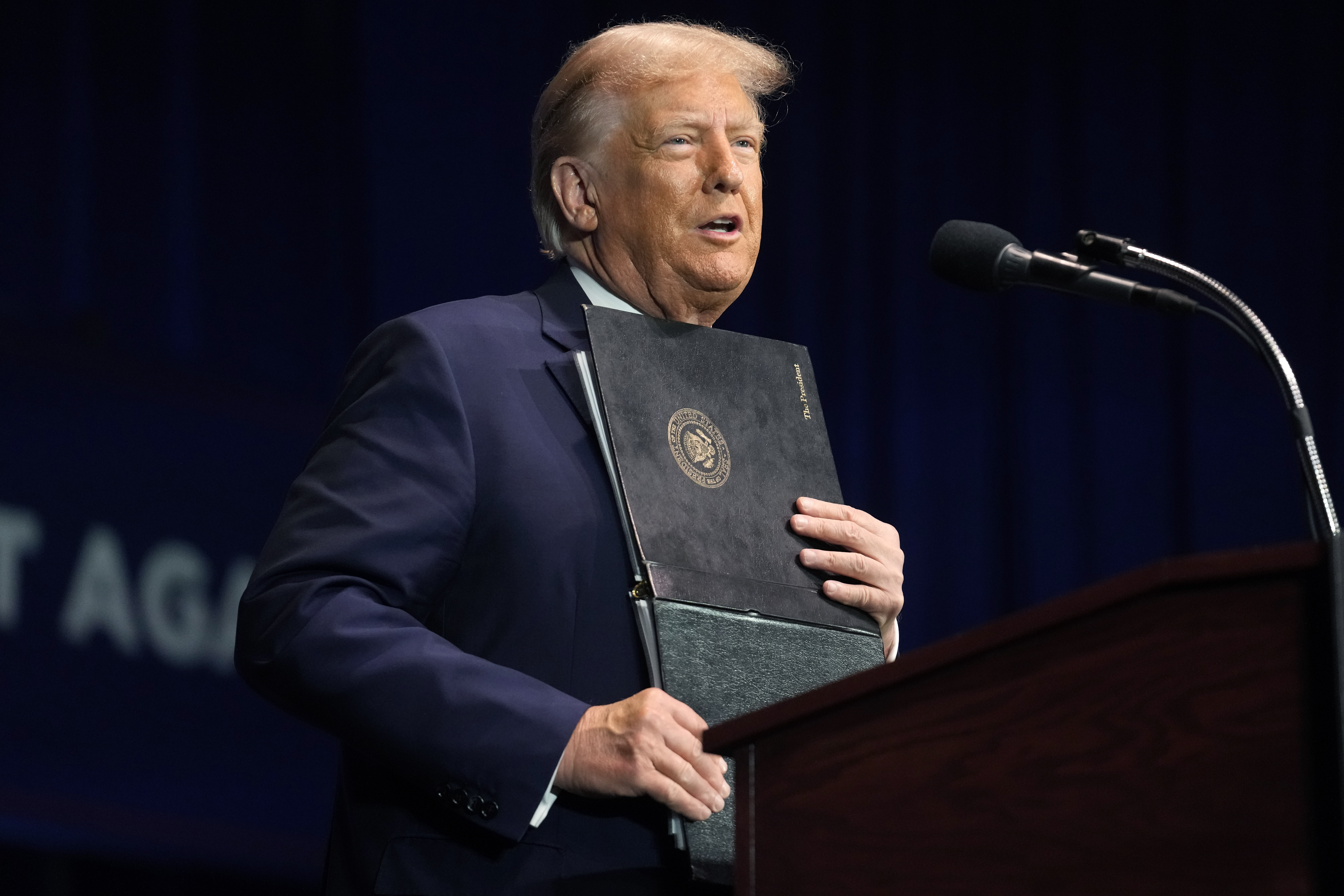What war? Trump is busy talking about whales, weightlifting and the Patriots
The attack on Israel could be a major general election issue. But it isn’t changing the trajectory of the GOP primary.


WOLFEBORO, N.H. — In a weekend filled with politicians offering criticisms and condemnations over the state of the world, Donald Trump on Monday had a few.
For the Wall Street Journal editorial page (“globalists”), for windmills (“we see whales washing up on shore”); for Florida Gov. Ron DeSantis (“He’s fallen like a wounded bird from the skies”) and his indictments (“a great badge of honor”); for transgender athletes (“Have you seen the weightlifting records?”) and even for one of the region’s most cherished institutions: the New England Patriots (“not a good game” Sunday).
The attack on Israel may have been consuming much of official Washington. But in the small auditorium in a performing arts center in Wolfeboro, N.H., where Trump rallied his base of voters on Monday, it was not topic one, two or even 13.
In all, it took Trump over an hour to spend any significant amount of time discussing the fighting that erupted in the Middle East following the murder of an estimated 900 Israelis. Reading from a teleprompter, Trump blamed President Joe Biden for “tossing Israel to the bloodthirsty terrorists,” for reengaging diplomatically with Iran and for not doing enough to support Israel’s president, Benjamin Netanyahu.
“Less than four years ago, we had peace in the Middle East,” Trump said. “Today we have an all-out war in Israel and it’s gonna spread quickly. What a difference a president makes. Isn’t it amazing?”
After claiming that Hamas may be infiltrating the U.S.-Mexico border and suggesting, also without evidence, that the group could launch a domestic attack, he reverted back to familiar themes: obliterating the Deep State, attacking Hillary Clinton and preventing World War III.
Trump has never been one to stick to script or to refashion his speeches because of the news of the day. But his riff on Monday suggested he had scant organic interest in the events in Israel and saw little upside in making it part of the primary.
On the latter, he doesn’t appear to be alone. The prospect of a broader war between Hamas militants and Israel could have significant repercussions in the general election, serving as a gauge of Biden’s management of conflict abroad. But in a Republican primary buffeted by an unusual amount of foreign policy — from concerns about China and Ukraine to, now, Israel — it so far appears unlikely to alter the trajectory of the race at all.
“If we’re not at war – at least not directly, troops not committed and that type of thing – it’s not as big an issue,” said Wayne MacDonald, a New Hampshire lawmaker and past state Republican Party chair who supports former New Jersey Gov. Chris Christie. “Guns and butter, so to speak.”
Immediately after the attack, it seemed possible that the crisis might become a wedge issue among the GOP candidates — deepening the rift between the party’s isolationist and more engagement-oriented strains of foreign policy. Former Vice President Mike Pence, campaigning in Iowa over the weekend, faulted “voices of appeasement like Donald Trump, Vivek Ramaswamy and Ron DeSantis that I believe have run contrary to the tradition in our party that America is the leader of the free world.”
But Pence, polling in single digits, was largely a voice in the wilderness. The rest of the Republican field highlighted the atrocities not to critique each other or demand a more internationalist foreign policy in general, but to attack the current administration.
Trump called Biden, the Democratic president, “weak.” He was “sleeping on the job,” DeSantis said. Christie criticized policies of “appeasement and isolationism,” but did so in a rebuke of Biden, not fellow Republicans. Even Haley, who broke before with Trump on foreign policy, on China and Ukraine, did little to create any distance on the issue with her rivals.
Instead, she drew a connection from Israel to the Southern border.
“I have been terribly worried about the fact that Iran has said the easiest way to get into America is through the southern border,” Haley said on NBC on Sunday. “We have an open border. People are coming through; they’re not being vetted.”
Haley and others have come out in recent days with specific policies that they believe the U.S. should adopt in the wake of the attacks. Haley called for actions including providing arms and intelligence to Israel and clamping down on Iran. DeSantis, among other things, called for cutting off “any and all types of foreign aid flowing to Hamas.”
And there are some Republicans who do see the attack on Israel as motivating for the party’s voters. Attendees at Trump’s rally expressed broad support for “our ally” Israel — and universal condemnation of Biden over Hamas’ attacks.
“The blood’s on Biden’s hands,” said Jill Hegner, a Gilford, N.H., Republican who’s “300 percent” with Trump and arrived at the performing arts center at 6:30 a.m. to beat the throngs of thousands of people hoping to snag one of the roughly 100 seats inside.
“Trump, we had no new wars, peace in the Middle East,” Hegner said. “The first thing that Biden did when he got into office was get rid of all of that. It’s unbelievable to me.”
Stephen Stepanek, Trump’s senior adviser in New Hampshire and a former state Republican Party chair, said in a brief interview that “the world was a lot safer when Donald Trump was president.” A yarmulke — a head covering worn by observant Jewish men — dotted the sea of red-and-white “Make America Great Again” baseball caps and “America First” hoodies.
And yet Trump’s supporters in New Hampshire — and GOP voters more broadly — remain more concerned about problems at home than abroad.
When Gallup asks Americans what the most important problem facing the country is today, foreign policy barely registers. Republicans are far more concerned about domestic issues like inflation and immigration — both of which Trump played into on Monday, and both of which elicited far more cheers than talk of trouble abroad.
People leapt to their feet when Trump called to “stop child sexual mutilation” and dismantle the Department of Education. They whipped out their phones not to record Trump’s remarks on the state of the world but to capture his dramatic reading of a poem called “The Snake.” He won applause for talking about how he reopened waters off New England’s coastline for lobstering and was greeted with silence when he said Biden “betrayed” Israel’s leader Netanyahu.
And even as they said America should support Israel, voter after voter who came to hear Trump in New Hampshire decried the United States’ continued financial support of another country locked in a bloody battle: Ukraine.
Dave Urban, a Republican operative and former Trump adviser, described the attack on Israel as a “very fluid dynamic situation which is very sensitive on many fronts,” and suggested there wasn’t much more that Trump could say on the subject.
“He’s already put out his statement,” Urban said. “In his case he’s like, ‘I moved the embassy. I’m the most pro-Israel president we’ve ever had.’ … What’s he going to say that’s going to be politically useful?”












